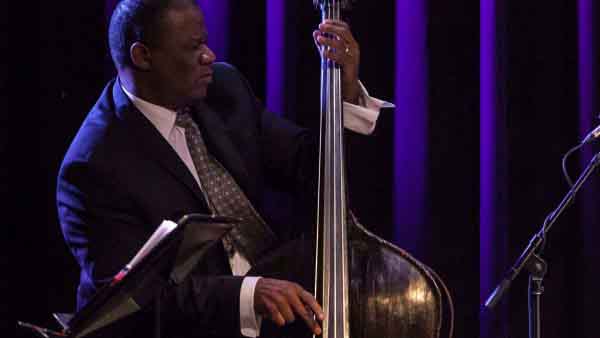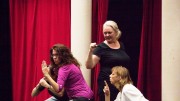Students close to a U of M investigation into the conduct of a former professor in the Desautels faculty of music are criticizing the process, saying it was tailored more toward protecting the university than students.
As reported by the CBC in a series of stories beginning last week, two separate university investigations into the actions of Steve Kirby, the once-lauded head of the U of M jazz program, concluded that Kirby’s conduct constituted “sexual harassment” and would have created an “intimidating, humiliating or offensive work or learning environment” for female students.
It was reported that Kirby was on leave for six months before retiring from the U of M in June and later taking a job at Berklee College of Music in Boston. He has since been placed on leave at that school while it conducts its own investigation. Further reports claim the U of M was approached with complaints against Kirby as far back as 2012.
Kieran Labossière, senior stick of the Faculty of Music Students’ Association (FMSA) between 2015-2017, said a number of women in the program approached him in the 2016 fall term with complaints regarding Kirby.
He said students met with the university administration looking for information regarding the options available to them, saying some feared repercussions if their names were attached to a complaint. He said Kirby is well-known and active not only within the Winnipeg music community but abroad, and students worried having their names included in an investigation would hurt their professional and academic careers.
Days later, Labossière said the students learned that an official investigation had been opened without their direct consent, which he said took away their agency to pursue the complaint on their own terms.
“It is clearly necessary that some action be taken,” he said, “but it was taken out of the hands of the students affected as to what action would be taken, and on what terms.”
“It seemed like the university was initiating this investigation less on the behalf of students, or protecting students, and more on behalf of protecting itself,” he said.
“Because if it was sincerely interested in defending students, it would have consulted with students before and had obtained at least some form of consent, or had made students aware of the fact that the university was going to pursue an investigation process.”
University of Manitoba executive director of public affairs John Danakas said in an email that the university will initiate its own investigation if “matters come to light that are serious in nature, and are of sufficient importance to warrant an investigation,” noting that participation is voluntary and a person cannot be compelled to be a witness.
“The first and foremost priority for the university is the safety of its community, and particularly students,” he said. “Moving quickly to initiate an investigation demonstrates the seriousness with which the university deals with any issues that potentially pose a threat to the safety of students.”
A recent graduate of the music faculty’s classical program – who testified in the investigation and requested anonymity – said she learned Kirby’s behaviour was well-known within the jazz department after sharing her own experiences with other students.
While her own interactions with the professor – which included off-colour comments of a sexual nature that she said she would not label as sexual harassment – were limited, she said that “Everyone just knew. They were like, ‘Oh yeah, that’s Steve.’”
“For so many years we were like, ‘There’s nothing we can do. We’re not going to bring it up with the dean because he’s just not going to do anything about it,’” she said.
“The way the faculty of music dealt with the whole thing, they didn’t exactly deal with it in a way that supported the women,” she added. “It dealt with it in a way that was super hush-hush.”
She said her own experiences with Kirby occurred years ago and included remarks about her appearance, both in his office and at off-campus improv jazz sessions the faculty is regularly involved with at a local venue.
“The only time he ever acknowledged me is when he was saying objectifying comments towards my physical appearance,” she said. “Otherwise, he would act like he didn’t know me because I was in the classical [program].”
Other reports of Kirby’s actions toward students involve inappropriate touching, including hugging.
The recent grad said learning Kirby was back at work at another university was incredibly upsetting and frustrating.
“Steve Kirby almost got off scot-free until the last week-and-a-half, two-weeks, when all this press came up,” she said. “He almost just left as if ‘Oh, he just retired and got a job at Berklee and everything’s fine.’ And that’s not OK.”
Labossière also said he was upset to learn not only that Kirby had quietly moved on from the U of M, but that there was no report to the university community on the findings of the investigation.
“I think that every single student in the faculty of music – and the university – should absolutely have had a right to know the findings of that investigation and every student should have been made aware of what had happened,” he said.
The FMSA issued a response to the investigation Monday, lauding the “courageous women who came forward at great personal risk” and saying it is deeply troubled by allegations the university mishandled previous complaints and disclosures.
The association also called for more transparency from the university.
“We do feel the need to clarify that we were not given any advance notice or explanation as to when or why professor Kirby would no longer be employed by the university,” said the release. “Students are understandably upset and are requesting information; we hope that the university will be more forthcoming, while respecting the privacy of those involved.”
Danakas said privacy legislation bars the university from commenting on an investigation or an individual’s private information, but added that the university “respects and values the thoughts and feelings of any individuals who come forward to disclose information related to behavioural issues.”
“Regardless of whether there might be differences of opinion on the effectiveness of policies and procedures,” he said, “the voices of students and others who show the courage to share their concerns are taken seriously.”
In an email issued to students and faculty Friday, U of M president David Barnard said the university’s policies, revised just last year, are “responsive to the needs of the community.”
“The policies have been tested, and they work,” he wrote, adding that they will be reviewed regularly and feedback from the university community is valued.
Kirby was hired by the U of M as director of jazz studies in 2003. An internationally renowned jazz bassist, he helped recruit world-class instructors to the university.
He was also instrumental in the development of a faculty outreach initiative that connects at-risk youth in Winnipeg’s inner city with instruction from third- and fourth-year students of the jazz program, and served as editor-in-chief of Dig! magazine, a local bi-monthly jazz publication that recently shut down operations after 14 years.





